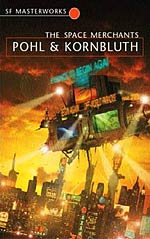
![]() couchtomoon
couchtomoon
12/30/2014
![]()
It's a jarring experience to read '50s SF after devoting a month to the '70s. After a set of socially critical, sometimes psychedelic reads with Pohl, Silverberg,Dick, and Farmer, even a sophisticated 1953 satire like The Space Merchantsfeels stodgy and quaint. I often turn to '50s SF when my brain is tired of broody and sullen plots, because that Golden Age lightness feels fresh and inviting in comparison... especially when you recognize that every decade (even our own, omg!) has its own brand of whitewashed, gender neglect.
I mentioned last week that criticism of SF's future tech is unfair and irrelevant because the albeit wayward juxtaposition of flying cars with landline telephones has no impact on the overall message of the story. Pohl and Kornbluth are no different in this regard. But, much as I love William Gibson for his (occasional) bulls-eye accounts of future tech, the most fascinating and more important SF prophesizing comes from authors speculating on issues that most impact us socially: climate change, gender & racial oppression, class divide...
...and corporatism.
And that's where we find The Space Merchants.
It's 1984 and Mitch Courtenay is a star-class copywriter for Fowler Shocken, one of the biggest advertising agencies in the U.S. His biggest assignment yet, he's in charge of the campaign to encourage the consumers to support efforts to colonize Venus, essentially a death trap with no viable plans for terraforming. But a series of setbacks occurs, which suggest sabotage, but he can't identify his enemies. Can he trust his competitive colleagues? His wife? And what about those crazy Conservationists?
Wedged in between an incredibly prescient social message and the trappings of 1950s social stiflement, The Space Merchants is a conflicting brew of clairvoyance and jammed gears. Amid the onslaught of jokey jabs at homosexuality, persons of short stature, and "girls" (we usually call them women), Pohl and Kornbluth warn of the dehumanizing and undemocratic dangers of capitalism run amuck, where:
India has been converted to Indiastries, "merging a whole subcontinent into a single manufacturing complex" (4),
School cafeterias are zones for subliminal consumer loyalty programs where "Kiddiebutt cigarette rations are wrapped in colorful Starrzelius red" (4),
Corporate interests overwhelm government decisions, ("it's odd how we still think and talk of that clearinghouse for pressures as though it were an entity with a will of its own" [10]),
Corporate warfare is a real thing ("And they say there are still bloodstains on the steps of the General Post Office where Western Union and American Railway Express fought it out for the mail contract" [16] and "Killing in an industrial feud is a misdemeanor. Killing without Notification is a commercial offense" [45]),
The decline of intellectual pursuits where "The correlation is perfectly clear. Advertising up, lyric poetry down" (48),
Overpopulation on Earth where "the most impressive thing about it to me was not the rocket itself but the wide swathe around it" (57),
And the invasion of advertising on our landscape, which even blocks the view from airplane windows, ("... wham: a sleazy, over-sexed Taunton ad for some crummy product opaques the window and one their nagging, stupid jingles drills into your ear" [68]).
And even Mitch's behavior as a corporate schmuck is a hilarious and honest portrayal of the white collar boardroom and the sycophantic behavior of lower-management types:
"He took time to look at each of our faces searchingly, ignoring the forest of hands in the air. God help me, mine was right up there too" (4),
"...made all of us capable of any act that served our god of Sales" (9),
"And you know the old saying, 'Power ennobles. Absolute power ennobles absolutely'" (44).
There are two classes of people in this world of unbridled corporatism: the star-class (advertising and corporate executives, and their "girls") and the consumers. Little interplay occurs between the two classes, except in the form of the daily infiltration of advertising, overt and covert, to convince the consumer drudges that happiness will come from more bags of salty Crunchies and more bottles of fizzy Popsie (and more of those recommended cups of Coffiest, which may or may not contain a dangerous amount of addictive substances).
With The Space Merchants, you get two clever authors delivering their darkly funny visions of the future (our past) in a democracy ruled by an unchecked free market, and they tell it from what constitutes a '50s liberal worldview, where they strive to demonstrate some social progress, if limited by our standards. We meet Mitch's fiancée, a surgeon who is ready to dump him because she senses his expectations for her to prioritize home over career. We also meet a person of short stature, the most celebrated astronaut of his time, and a heartthrob among the ladies in New York. But even these two compelling characters cannot escape the authors' easy jokes that come from being a "girl" and a "midget."
Which is part of what I appreciate about these '50s novels: we see the seedlings of social progress from the minds of "boys" who are clever enough to know that society can do better, yet they can't quite picture the end product. And coming off a season of consumer holidays overlaid on a backdrop of civil unrest, I'm not sure our vision is any better today.
Recommended for folks who think Mad Men would be better if written by Orwell and Vonnegut.
http://couchtomoon.wordpress.com